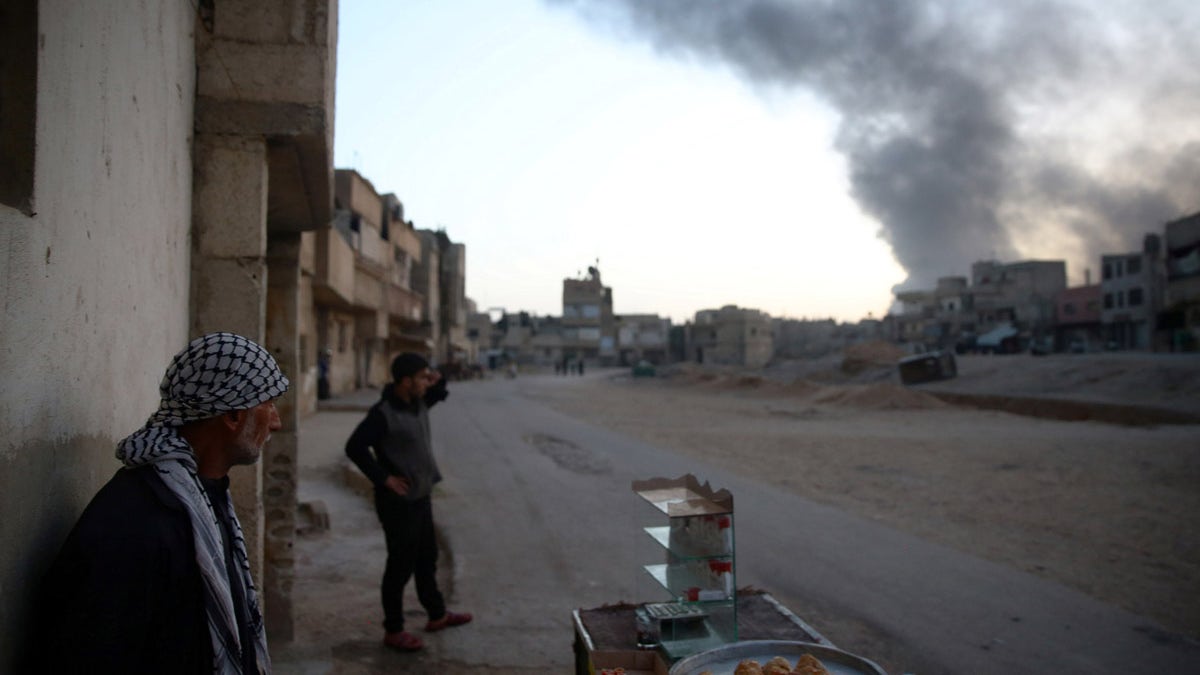
Syrian residents watch as smoke rises from Harasta area, as seen from Douma, in the eastern Damascus suburb of Ghouta, Syria November 14, 2017. REUTERS/Bassam Khabieh - RC1B753E7E30
The Trump administration inherited a bad situation in Syria, but it has managed to make matters even worse. There is no better illustration of the problem than the fact that Turkey, a NATO ally, sought permission from NATO’s chief adversary, Russia, to attack America’s local partner in Syria despite U.S. pressure not to do so.
It's time to do more than try to manage this particular crisis. It's time to rethink the fundamental policies that got us here.
The Trump administration has good big ideas. It rightly seeks, for example, to pivot way from Obama’s single-minded focus on ISIS, and refusal to recognize the Iranian threat in Syria.
The Trump White House identifies Iran as a primary threat. It has verbally committed to the departure from power of Bashar al Assad. It claims to prioritize repairing relations with Turkey; seeks to destroy al Qaeda; and wants to refocus the U.S. on Syria’s humanitarian catastrophe.
These are the correct goals for which American policy should strive. In fact they are the minimum essential goals the U.S. must achieve to secure its vital national interests in the Middle East and as part of a global strategy.
The U.S. must recognize the threat Russia poses. It must acknowledge the limits of its current partners on the ground. It cannot put faith in a diplomatic charade. It must implement a real strategy against al Qaeda and Iran. And it must recognize the value of American action over American rhetoric.
The problem is that the strategy Secretary of State Rex Tillerson has outlined will not accomplish these goals. The U.S. must rapidly change how it is executing policy in five key areas.
? Russian military bases. The administration has tacitly surrendered to Vladimir Putin the most important thing he has ever sought in Syria—permanent Russian air and naval bases on the eastern Mediterranean. Those bases force NATO to develop new plans for scenarios that include a Russian move to deny access to key maritime routes and the airspace over the Middle East. The U.S. and its allies will need air and naval forces prepared to defend the eastern Mediterranean, which has been a NATO lake for more than 25 years. Contesting these bases may not be an appropriate near term goal, but the administration's refusal to say they are unacceptable is tacit acceptance of one of the most significant geostrategic reversals since the end of the Cold War.
? Acceptance of Bashar al-Assad. American policy in Syria is to accept Assad and his regime de facto, regardless of any tough administration statements. Tillerson argues that the sustained deployment of American forces to areas held by the opposition Syrian Democratic Forces (SDF) puts the U.S. on a path toward Assad’s departure. The opposite is true. The Syrian Kurdish People’s Protection Units (YPG), which dominates the SDF, controls territory only in northern and eastern Syria, generally far away from the Syrian heartland that matters most to the regime and the opposition. It never meaningfully fought the regime and did not intend to depose Assad even before Turkish President Recep Tayyip Erdogan set about taking it apart by force.
? Syrian “de-escalation.” The “de-escalation” agreement that President Trump signed in November 2017 with Russia is a surrender not only to Russia, but also to Iran. It heavily favors Assad. In that deal, Russia promised to compel Iran to withdraw its forces from southern Syria. It never happened. Pro-regime forces violate the de-escalation zone with impunity.
? The “peace” process. The diplomatic process in Syria has been a farce since at least 2015. Assad has never intended to grant serious concessions to his opposition and the U.S. has done nothing to compel him to do so. Russia has coopted the diplomatic track to keep Assad in power with limited U.S. resistance. The American goal appears to be an election. Assad will win: Putin will make sure of it.
? Iran and al Qaeda. Tillerson uses vague terms like “deny their dreams” to describe our strategy against Iran in Syria. He identifies no clear goal against which the U.S. can measure success. He states that the U.S. must deliver an “enduring defeat” to al Qaeda—and we certainly must. Yet the U.S. Defense Department has offered no vision of how to do that. The strategy Tillerson outlines—and that the U.S. is pursuing--amounts to outsourcing the problem to Turkey, which is actually working with al Qaeda in Syria.
The good news is that when the U.S. acts in accord with reality, it achieves results. The President conducted a proportional strike in response to the Assad regime’s use of sarin gas against civilians in April 2017. There have been no more sarin attacks. Even this success is qualified, however. The Assad regime still routinely uses chemicals against his population that are not strictly covered in the Geneva Conventions.
The U.S. must face reality in Syria. It must recognize the threat Russia poses. It must acknowledge the limits of its current partners on the ground. It cannot put faith in a diplomatic charade. It must implement a real strategy against al Qaeda and Iran. And it must recognize the value of American action over American rhetoric.
Two administrations have sought to substitute rhetoric for action and to outsource American interests to local partners. The U.S. must abandon this approach and recognize Syria’s importance to American security.
It will take a long time and a hard struggle to achieve any outcome in Syria that the U.S. should be willing to live with. It is time to focus on it, devote resources to it, and prepare to do so for a long time.
